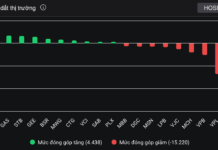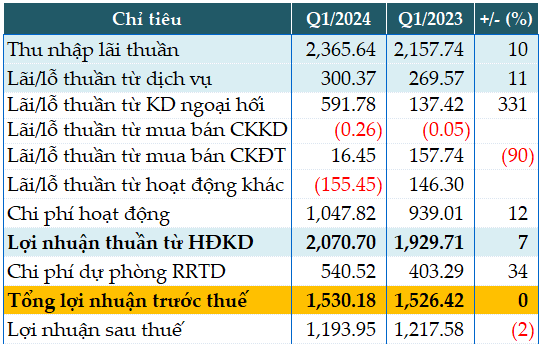After a customer of Eximbank in Quang Ninh experienced a transaction of 8.5 million VND but received a debt notification of over 8.8 billion VND after nearly 11 years, many people panicked and contacted banks to check their accounts and close unused cards.
Annual fees accrue interest as well
Ms. Le Thi Diep, a resident of Phu Nhuan district, Ho Chi Minh City, said that a year ago, a bank employee came to her house to open a credit card and informed her that she would be exempt from annual fees in the first year. However, this person did not mention how the following years would be calculated, nor did they explain how much interest and fees would be charged if there were overdue debts.
After using the card for one year with one transaction and repaying the debt in full, Ms. Diep recently received a message stating that she owed 2 million VND on her credit card and requested a minimum payment of 100,000 VND before March 26. Immediately, she contacted the issuing bank and found out that this debt was due to the annual fee charged by the bank.
“When I opened the card, I forgot to ask about the annual fee for the second year. If I had known that the fee was 2 million VND, I might not have agreed to open the card. Did the bank intentionally omit this information because the fee was high and the staff didn’t want customers to refuse to open the card?” Ms. Diep raised the issue.

Annual fees have also attracted the attention of many credit cardholders in recent days. The annual fee for each type of card and credit limit ranges from a few hundred thousand to a few million VND. Especially, this fee is added to the monthly debt balance of the cardholders. If the cardholders forget or ignore it, the bank will still charge interest and classify it as bad debt.
“I had to pay 1.9 million VND as an annual fee to close a credit card account even though there were no transactions in the second year. In the first year, my daughter’s school had a credit card program for parents to enjoy tuition fee discounts. When the second year came and I had no need for the card, I found out that I had to pay nearly 2 million VND as an annual fee,” said Ms. Ngoc Khanh, a resident of Thu Duc district, Ho Chi Minh City.
Mr. Le Viet Dung, a resident of Go Vap district, Ho Chi Minh City and a credit cardholder of a bank in Ho Chi Minh City, said he had paid off his debt at the end of 2023, but he still had to pay a fee of 30,000 VND for receiving account statements sent by the bank through postal service every month.
“The amount is not large, but if the letter is lost or I forget to pay, the bank will charge a very high interest and penalty. Because I found it inconvenient and unsafe after the incident of the cardholder with an 8.8 billion VND debt in Quang Ninh, I decided to go to the bank and request full settlement and cancellation of the credit card,” Mr. Dung said.
Spending a million VND on account closure fees?
Notably, in recent days, not only credit cardholders but also users of ATM cards and debit cards were shocked to find out that their unused cards were still charged with various fees.
Mr. Duong Hai, a resident of District 3, Ho Chi Minh City, said he opened an Eximbank account to receive his salary, but in recent years, he has not used it as his organization switched to paying salaries at another bank.
“When I went to close the account, I found out that I had to pay nearly 600,000 VND for the account management fee, even though the account balance had reached 0 VND and there had been no transactions for several years. The bank still charged this fee and I had to settle the fee before closing the account,” Mr. Hai said.
According to the investigation of Người Lao Động newspaper reporter, Eximbank’s fee schedule includes an account fee for non-term payment of 10,000 VND/month (charged when the average balance in the month is below 300,000 VND). This means that when customers do not use the account and the balance is below 300,000 VND, the bank will deduct a fee of 10,000 VND per month. Not only Eximbank, but some other banks also charge account management fees. However, the fee policy of each bank is different.
Also on March 18, many people went to transaction offices and branches of banks to check and close unused credit cards and accounts for fear of incurring debt.
Ms. Ngoc Yen, a resident of Thu Duc district, Ho Chi Minh City, said it took her a day to visit all the banks where she had opened cards to check and close unused accounts. At Agribank, the staff informed her that her ATM card had been temporarily locked after 6 months of no transactions; BIDV also automatically locked the card after 12 months of no transactions…
Other banks such as Sacombank, VietinBank also stated that they “freeze” accounts when the balance reaches 0 VND and no transactions are made for 12 months or more.
In an exchange with reporters, representatives of Agribank, BIDV, Sacombank, VietinBank… confirmed that when a customer’s payment account has a balance of 0 VND and no transactions for 12 months, the bank will “freeze” the account to prevent it from being included in the statistics and avoid additional account management fees.
Controlling fees and setting interest rate caps
Regarding bank card service fees, in reality, most ATM cardholders keep a balance of several million or even hundreds of millions VND for payments. This means that banks are able to mobilize a large amount of deposits from millions of customers at a very low cost, as they only pay an interest rate of 0.2% – 0.5% per year. Meanwhile, banks can use this money to provide short-term loans with much higher interest rates.
In addition, banks charge various fees for payment accounts, such as account management fees, fees for receiving balance change text messages (ranging from tens of thousands to hundreds of thousands VND per month, depending on the number of messages), ATM withdrawal fees of 1,000 – 3,000 VND per transaction, annual fees, etc.
Some experts believe that charging too many types of fees like this makes the benefits of cardholders and banks not harmonious. Banks should consider reducing the fees to ensure the benefits of all parties involved and encourage customers to use payment services.
“An account with 0 VND for many years is still charged with fees without the customer’s knowledge or notification. It is unfair for customers who are not aware of it or do not understand it until they check or close their accounts. It is time to have regulations to adjust these types of fees,” said a financial expert.
Regarding the credit card interest of up to 8.8 billion VND for the cardholder in Quang Ninh, although it is not known whose fault it is, lawyer Truong Thanh Duc, Director of ANVI Law Firm, believed that banks should not determine interest rates for loans, especially consumer loans, on their own. According to the Civil Code, loan interest rates are agreed upon by the parties but must not exceed 20% per year, except for cases where other relevant laws have different regulations. When added to overdue interest, the interest rate should not exceed 30% per year.
According to the Criminal Code, lending with an interest rate above 100% is considered usurious lending. However, these interest rate caps do not apply to the banking sector. This sector is only regulated by the Credit Institutions Law, so banks can offer loans with an interest rate of 100%, charge an overdue interest of 150% per year, and especially calculate interest on the principal, which is often called “interest producing interest,” resulting in a large amount of debt but not considered high-interest loans.
Specifically, in the case of Eximbank credit cards, they might apply compound interest, cumulative interest, add interest to principal, or commonly known as “mother interest generates child interest,” calculated on a monthly basis, so it is entirely possible for the debt to jump from 8.5 million VND to 8.8 billion VND if an overdue interest rate of about 70% per year is applied.
“How customers are subjected to interest costs, penalty interest, and various fees will be agreed upon in the loan or card use contract. However, sometimes customers do not read or even if they read it, they do not understand it. Therefore, it is time to amend the law and apply uniform regulations on interest rates for loans to ensure equal and reasonable benefits for all economic entities,” lawyer Truong Thanh Duc said.
Charging fees for account freezing?
TPBank stated that in the case of a customer’s account having no transactions but not being locked/closed, there will be an account fee after 6 consecutive months of inactivity (5,000 VND/month). “TPBank won’t charge when the account has 0 VND. The fee policy changes depending on different periods, and at the moment, the bank only charges the previous period fee (5,500 VND) for accounts inactive for 6 months or more,” said the bank representative.


































